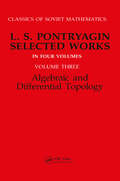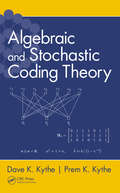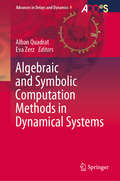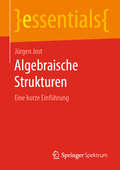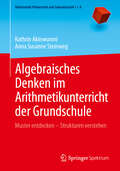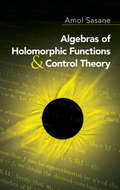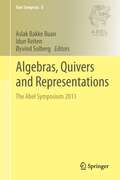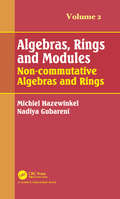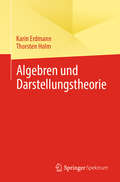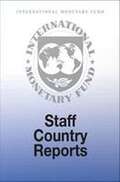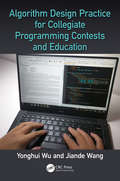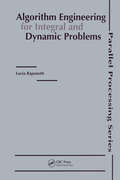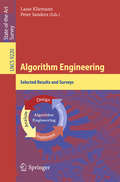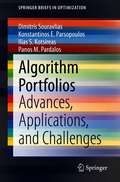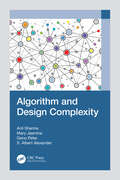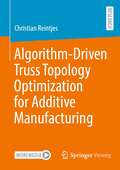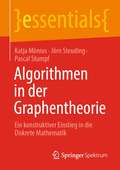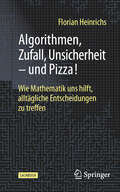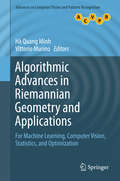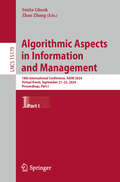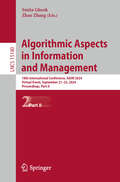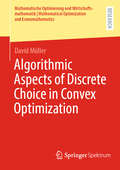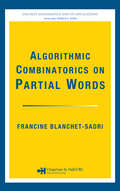- Table View
- List View
Algebraic and Differential Topology
by R.V. GamkrelidzeAlgebraic and Differential Topology presents in a clear, concise, and detailed manner the fundamentals of homology theory. It first defines the concept of a complex and its Betti groups, then discusses the topolgoical invariance of a Betti group. The book next presents various applications of homology theory, such as mapping of polyhedrons onto other polyhedrons as well as onto themselves. The third volume in L.S. Pontryagin's Selected Works, this book provides as many insights into algebraic topology for today's mathematician as it did when the author was making his initial endeavors into this field.
Algebraic and Stochastic Coding Theory
by Prem K. Kythe Dave K. KytheUsing a simple yet rigorous approach, Algebraic and Stochastic Coding Theory makes the subject of coding theory easy to understand for readers with a thorough knowledge of digital arithmetic, Boolean and modern algebra, and probability theory. It explains the underlying principles of coding theory and offers a clear, detailed description of each code. More advanced readers will appreciate its coverage of recent developments in coding theory and stochastic processes. After a brief review of coding history and Boolean algebra, the book introduces linear codes, including Hamming and Golay codes. It then examines codes based on the Galois field theory as well as their application in BCH and especially the Reed–Solomon codes that have been used for error correction of data transmissions in space missions. The major outlook in coding theory seems to be geared toward stochastic processes, and this book takes a bold step in this direction. As research focuses on error correction and recovery of erasures, the book discusses belief propagation and distributions. It examines the low-density parity-check and erasure codes that have opened up new approaches to improve wide-area network data transmission. It also describes modern codes, such as the Luby transform and Raptor codes, that are enabling new directions in high-speed transmission of very large data to multiple users. This robust, self-contained text fully explains coding problems, illustrating them with more than 200 examples. Combining theory and computational techniques, it will appeal not only to students but also to industry professionals, researchers, and academics in areas such as coding theory and signal and image processing.
Algebraic and Symbolic Computation Methods in Dynamical Systems (Advances in Delays and Dynamics #9)
by Alban Quadrat Eva ZerzThis book aims at reviewing recent progress in the direction of algebraic and symbolic computation methods for functional systems, e.g. ODE systems, differential time-delay equations, difference equations and integro-differential equations. In the nineties, modern algebraic theories were introduced in mathematical systems theory and in control theory. Combined with real algebraic geometry, which was previously introduced in control theory, the past years have seen a flourishing development of algebraic methods in control theory. One of the strengths of algebraic methods lies in their close connections to computations. The use of the above-mentioned algebraic theories in control theory has been an important source of motivation to develop effective versions of these theories (when possible). With the development of computer algebra and computer algebra systems, symbolic methods for control theory have been developed over the past years. The goal of this book is to propose a partial state of the art in this direction. To make recent results more easily accessible to a large audience, the chapters include materials which survey the main mathematical methods and results and which are illustrated with explicit examples.
Algebraische Strukturen: Eine kurze Einführung (essentials)
by Jürgen JostDie Konzepte in der Algebra wie Gruppen, Ringe, Körper gewinnen ihre mathematische Bedeutung und Kraft aus der Verbindung von abstrakten Strukturen und wichtigen Beispielen. Dieses essential bietet eine kompakte Einführung in diese algebraischen Strukturen und deren Zusammenwirken beispielsweise in der Galoistheorie. Die zentralen Beispiele, also die ganzen, rationalen, reellen und p-adischen Zahlen und die symmetrischen Gruppen, motivieren und veranschaulichen die abstrakten Konzepte. Die Leser*innen gewinnen eine gute Übersicht über die strukturellen Grundlagen der Algebra und bekommen einen Ausblick auf weiterführende Themen.
Algebraisches Denken im Arithmetikunterricht der Grundschule: Muster entdecken – Strukturen verstehen (Mathematik Primarstufe und Sekundarstufe I + II)
by Kathrin Akinwunmi Anna Susanne SteinwegDieses Buch thematisiert algebraisches Denken in der Grundschule als wesentlichen Kern der übergreifenden Leitidee „Muster, Strukturen und funktionaler Zusammenhang“ in den aktuellen KMK-Bildungsstandards.Für algebraische Lehr-Lernprozesse ist eine Unterscheidung zwischen sichtbaren Mustern und allgemeinen Strukturen wesentlich; eine solche wird hier vorgelegt und an vielen Beispielen konkretisiert: Muster machen aufmerksam und lassen neugierig werden. Die Suche nach Begründungen des Musters erwartet, die Tür zu dahinterliegenden Strukturen zu öffnen. Strukturen, d. h. die mathematischen Eigenschaften und Relationen, können so als ursächlich für die Regelmäßigkeit des Musters erkannt werden.Für die unterrichtliche Förderung und gezielte Unterstützung der algebraischen Denkentwicklung werden in diesem Buch einerseits Grundideen algebraischen Denkens für den Arithmetikunterricht ausgearbeitet und andererseits Prinzipien für Unterricht zu algebraischen Grundideen und ihr Zusammenspiel mit prozessbezogenen, allgemeinen Kompetenzen erläutert. Den vier algebraischen Grundideen folgend werden vielfältige, didaktisch aufbereitete Anregungen zur praktischen Umsetzung sowie jeweils entsprechendes Hintergrundwissen angeboten.Das Buch richtet sich an Lehramtsstudierende, an angehende und bereits praktizierende Lehrkräfte sowie an Personen, die in der Lehrerinnen- und Lehrerbildung tätig sind.
Algebras of Holomorphic Functions and Control Theory
by Amol SasaneThis accessible, undergraduate-level text illustrates the role of algebras of holomorphic functions in the solution of an important engineering problem: the stabilization of a linear control system. Its concise and self-contained treatment avoids the use of higher mathematics and forms a bridge to more advanced treatments. The treatment consists of two components: the algebraic framework, which serves as the abstract language for posing and solving the problem of stabilization; and the analysis component, which examines properties of specific rings of holomorphic functions. Elementary, self-contained, and constructive proofs elucidate the explorations of rings of holomorphic functions relevant in control theory. Introductory chapters on control theory and stable transfer functions are followed by surveys of unstable plants and the stabilization problem and its solution. The text concludes with suggestions for further reading and a bibliography.
Algebras, Quivers and Representations: The Abel Symposium 2011 (Abel Symposia #8)
by Idun Reiten Øyvind Solberg Aslak Bakke BuanThis book features survey and research papers from The Abel Symposium 2011: Algebras, quivers and representations, held in Balestrand, Norway 2011. It examines a very active research area that has had a growing influence and profound impact in many other areas of mathematics like, commutative algebra, algebraic geometry, algebraic groups and combinatorics. This volume illustrates and extends such connections with algebraic geometry, cluster algebra theory, commutative algebra, dynamical systems and triangulated categories. In addition, it includes contributions on further developments in representation theory of quivers and algebras. Algebras, Quivers and Representations is targeted at researchers and graduate students in algebra, representation theory and triangulate categories.
Algebras, Rings and Modules, Volume 2: Non-commutative Algebras and Rings
by Michiel Hazewinkel Nadiya M. GubareniThe theory of algebras, rings, and modules is one of the fundamental domains of modern mathematics. General algebra, more specifically non-commutative algebra, is poised for major advances in the twenty-first century (together with and in interaction with combinatorics), just as topology, analysis, and probability experienced in the twentieth century. This is the second volume of Algebras, Rings and Modules: Non-commutative Algebras and Rings by M. Hazewinkel and N. Gubarenis, a continuation stressing the more important recent results on advanced topics of the structural theory of associative algebras, rings and modules.
Algebren und Darstellungstheorie
by Karin Erdmann Thorsten HolmDieses sorgfältig verfasste Lehrbuch bietet eine zugängliche Einführung in die Darstellungstheorie von Algebren, einschließlich Darstellungen von Köchern. Das Buch beginnt mit grundlegenden Themen zu Algebren und Moduln und behandelt fundamentale Ergebnisse wie den Satz von Jordan-Hölder über Kompositionsreihen, den Satz von Artin-Wedderburn über die Struktur halbeinfacher Algebren und den Satz von Krull-Schmidt über unzerlegbare Moduln. Die Autoren behandeln anschließend detailliert Darstellungen von Köchern bis hin zu einem vollständigen Beweis von Gabriels berühmtem Satz, der die Darstellungstypen von Köchern anhand von Dynkin-Diagrammen charakterisiert. Das Lehrbuch benötigt nur Grundkenntnisse über lineare Algebra sowie Gruppen, Ringe und Körper und richtet sich an Studierende ab dem dritten Studienjahr. Mit zahlreichen Beispielen, die abstrakte Konzepte veranschaulichen, und mehr als 200 Übungen (mit Lösungen zu etwa einem Drittel davon), bietet das Buch eine beispielorientierte Einführung, die sich sowohl für das Selbststudium als auch zur Begleitung von Vorlesungen eignet.
Algeria: Statistical Appendix
by International Monetary FundA report from the International Monetary Fund.
Algeria: Statistical Appendix
by International Monetary FundA report from the International Monetary Fund.
Algeria: Statistical Appendix
by International Monetary FundA report from the International Monetary Fund.
Algorithm Design Practice for Collegiate Programming Contests and Education
by Yonghui Wu Jiande WangThis book can be used as an experiment and reference book for algorithm design courses, as well as a training manual for programming contests. It contains 247 problems selected from ACM-ICPC programming contests and other programming contests. There's detailed analysis for each problem. All problems, and test datum for most of problems will be provided online. The content will follow usual algorithms syllabus, and problem-solving strategies will be introduced in analyses and solutions to problem cases. For students in computer-related majors, contestants and programmers, this book can polish their programming and problem-solving skills with familarity of algorithms and mathematics.
Algorithm Engineering for Integral and Dynamic Problems
by Lucia RapanottiAlgorithm engineering allows computer engineers to produce a computational machine that will execute an algorithm as efficiently and cost-effectively as possible given a set of constraints, such as minimal performance or the availability of technology. Addressing algorithm engineering in a parallel setting, regular array syntheses offer powerful co
Algorithm Engineering: Selected Results and Surveys (Lecture Notes in Computer Science #9220)
by Lasse Kliemann Peter SandersAlgorithm Engineering is a methodology for algorithmic research that combines theory with implementation and experimentation in order to obtain better algorithms with high practical impact. Traditionally, the study of algorithms was dominated by mathematical (worst-case) analysis. In Algorithm Engineering, algorithms are also implemented and experiments conducted in a systematic way, sometimes resembling the experimentation processes known from fields such as biology, chemistry, or physics. This helps in counteracting an otherwise growing gap between theory and practice.
Algorithm Portfolios: Advances, Applications, and Challenges (SpringerBriefs in Optimization)
by Panos M. Pardalos Ilias S. Kotsireas Konstantinos E. Parsopoulos Dimitris SouravliasThis book covers algorithm portfolios, multi-method schemes that harness optimization algorithms into a joint framework to solve optimization problems. It is expected to be a primary reference point for researchers and doctoral students in relevant domains that seek a quick exposure to the field. The presentation focuses primarily on the applicability of the methods and the non-expert reader will find this book useful for starting designing and implementing algorithm portfolios. The book familiarizes the reader with algorithm portfolios through current advances, applications, and open problems. Fundamental issues in building effective and efficient algorithm portfolios such as selection of constituent algorithms, allocation of computational resources, interaction between algorithms and parallelism vs. sequential implementations are discussed. Several new applications are analyzed and insights on the underlying algorithmic designs are provided. Future directions, new challenges, and open problems in the design of algorithm portfolios and applications are explored to further motivate research in this field.
Algorithm and Design Complexity
by S. Albert Alexander Anli Sherine Mary Jasmine Geno PeterComputational complexity is critical in analysis of algorithms and is important to be able to select algorithms for efficiency and solvability. Algorithm and Design Complexity initiates with discussion of algorithm analysis, time-space trade-off, symptotic notations, and so forth. It further includes algorithms that are definite and effective, known as computational procedures. Further topics explored include divide-and-conquer, dynamic programming, and backtracking. Features: Includes complete coverage of basics and design of algorithms Discusses algorithm analysis techniques like divide-and-conquer, dynamic programming, and greedy heuristics Provides time and space complexity tutorials Reviews combinatorial optimization of Knapsack problem Simplifies recurrence relation for time complexity This book is aimed at graduate students and researchers in computers science, information technology, and electrical engineering.
Algorithm-Driven Truss Topology Optimization for Additive Manufacturing
by Christian ReintjesSince Additive Manufacturing (AM) techniques allow the manufacture of complex-shaped structures the combination of lightweight construction, topology optimization, and AM is of significant interest. Besides the established continuum topology optimization methods, less attention is paid to algorithm-driven optimization based on linear optimization, which can also be used for topology optimization of truss-like structures.To overcome this shortcoming, we combined linear optimization, Computer-Aided Design (CAD), numerical shape optimization, and numerical simulation into an algorithm-driven product design process for additively manufactured truss-like structures. With our Ansys SpaceClaim add-in construcTOR, which is capable of obtaining ready-for-machine-interpretation CAD data of truss-like structures out of raw mathematical optimization data, the high performance of (heuristic-based) optimization algorithms implemented in linear programming software is now available to the CAD community.
Algorithmen in der Graphentheorie: Ein konstruktiver Einstieg in die Diskrete Mathematik (essentials)
by Jörn Steuding Katja Mönius Pascal StumpfDieses essential liefert eine Einführung in die Graphentheorie mit Fokus auf ihre algorithmischen Aspekte; Vorkenntnisse werden dabei nicht benötigt. Ein Graph ist ein Gebilde bestehend aus Ecken und verbindenden Kanten. Wir untersuchen Kreise in Graphen, wie sie etwa beim Problem der Handlungsreisenden oder des chinesischen Postboten auftreten, fragen uns, wie sich mithilfe von Graphen (und insbesondere Bäumen) Routen planen lassen, und machen uns an die Färbung von Graphen, wobei keine benachbarten Ecken mit derselben Farbe versehen werden sollen. Diese klassischen Themen der Graphentheorie werden durch eine Vielzahl von Illustrationen und Algorithmen untermalt, über deren Laufzeit wir uns ebenfalls Gedanken machen. Viele bunte Beispiele erleichtern den Einstieg in dieses aktuelle und vielseitige Gebiet der Mathematik.
Algorithmen, Zufall, Unsicherheit – und Pizza!: Wie Mathematik uns hilft, alltägliche Entscheidungen zu treffen
by Florian HeinrichsDieses Buch lädt dazu ein, die Welt um uns herum aus einem neuen Blickwinkel zu betrachten und dabei die spannende Verbindung zwischen der Mathematik und unserem täglichen Leben zu entdecken – denn um die Technologien und Entwicklungen unserer modernen Gesellschaft zu verstehen, benötigen wir ein intuitives Verständnis grundlegender mathematischer Ideen. In diesem Buch geht es um diese Grundlagen, vor allem aber um ihre praktische Anwendung im Alltag: Gemeinsam begeben wir uns auf eine unterhaltsame Reise und entdecken dabei, wie Mathematik in vielfältiger Weise allgegenwärtig ist. Anschauliche Beispiele zeigen, wie wir täglich – oft unbewusst – mathematische Ideen nutzen und wie wir mit Hilfe von Mathematik bessere Entscheidungen treffen können. Nach einer Einführung in Algorithmen und Optimierungsprobleme, geht es im weiteren Verlauf um die Modellierung von Zufall und Unsicherheiten. Zum Ende des Buchs werden die Themen zusammengeführt und Algorithmen für Anwendungen besprochen, bei denen der Zufall eine entscheidende Rolle spielt. Sie erfahren unter anderem: Wie Sie systematisch Ordnung in Ihre Plattensammlung bringen können Warum ein vermeintliches Optimum nicht immer optimal ist Wie viele Getränke Sie bei einer Party bereitstellen sollten, damit niemand durstig nach Hause geht Wann Sie besser den nächsten freien Parkplatz nehmen sollten
Algorithmic Advances in Riemannian Geometry and Applications: For Machine Learning, Computer Vision, Statistics, and Optimization (Advances in Computer Vision and Pattern Recognition)
by Hà Quang Minh Vittorio MurinoThis book presents a selection of the most recent algorithmic advances in Riemannian geometry in the context of machine learning, statistics, optimization, computer vision, and related fields. The unifying theme of the different chapters in the book is the exploitation of the geometry of data using the mathematical machinery of Riemannian geometry. As demonstrated by all the chapters in the book, when the data is intrinsically non-Euclidean, the utilization of this geometrical information can lead to better algorithms that can capture more accurately the structures inherent in the data, leading ultimately to better empirical performance. This book is not intended to be an encyclopedic compilation of the applications of Riemannian geometry. Instead, it focuses on several important research directions that are currently actively pursued by researchers in the field. These include statistical modeling and analysis on manifolds,optimization on manifolds, Riemannian manifolds and kernel methods, and dictionary learning and sparse coding on manifolds. Examples of applications include novel algorithms for Monte Carlo sampling and Gaussian Mixture Model fitting, 3D brain image analysis,image classification, action recognition, and motion tracking.
Algorithmic Aspects in Information and Management: 18th International Conference, AAIM 2024, Virtual Event, September 21–23, 2024, Proceedings, Part I (Lecture Notes in Computer Science #15179)
by Zhao Zhang Smita GhoshThis two-volume set LNCS 15179-15180 constitutes the refereed proceedings of the 18th International Conference on Algorithmic Aspects in Information and Management, AAIM 2024, which took place virtually during September 21-23, 2024. The 45 full papers presented in these two volumes were carefully reviewed and selected from 76 submissions. The papers are organized in the following topical sections: Part I: Optimization and applications; submodularity, management and others, Part II: Graphs and networks; quantum and others.
Algorithmic Aspects in Information and Management: 18th International Conference, AAIM 2024, Virtual Event, September 21–23, 2024, Proceedings, Part II (Lecture Notes in Computer Science #15180)
by Zhao Zhang Smita GhoshThis two-volume set LNCS 15179-15180 constitutes the refereed proceedings of the 18th International Conference on Algorithmic Aspects in Information and Management, AAIM 2024, which took place virtually during September 21-23, 2024. The 45 full papers presented in these two volumes were carefully reviewed and selected from 76 submissions. The papers are organized in the following topical sections: Part I: Optimization and applications; submodularity, management and others, Part II: Graphs and networks; quantum and others.
Algorithmic Aspects of Discrete Choice in Convex Optimization (Mathematische Optimierung und Wirtschaftsmathematik | Mathematical Optimization and Economathematics)
by David MüllerThis book develops a framework to analyze algorithmic aspects of discrete choice models in convex optimization. The central aspect is to derive new prox-functions from discrete choice surplus functions, which are then incorporated into convex optimization schemes. The book provides further economic applications of discrete choice prox-functions within the context of convex optimization such as network manipulation based on alternating minimization and dynamic pricing for online marketplaces.
Algorithmic Combinatorics on Partial Words
by Francine Blanchet-SadriThe discrete mathematics and theoretical computer science communities have recently witnessed explosive growth in the area of algorithmic combinatorics on words. The next generation of research on combinatorics of partial words promises to have a substantial impact on molecular biology, nanotechnology, data communication, and DNA computing. Delving
